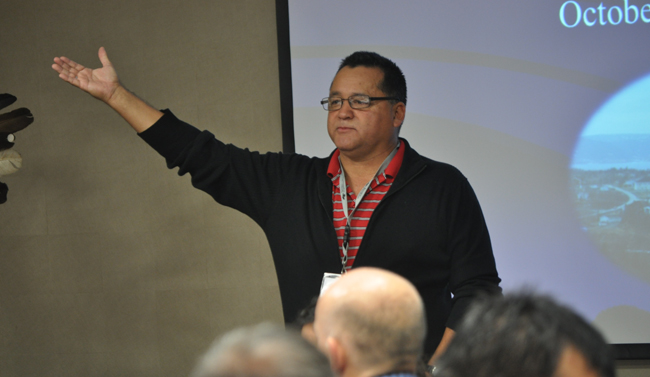Letter to Thomas Mulcair and Stephen Harper re: Bill C-10 violates treaty laws
March 27, 2014
Thomas J. Mulcair Leader of the Opposition, New Democratic Party House of Commons Ottawa, ON K1A OA6 Stephen Harper Prime Minister of Canada Office of the Prime Minister 80 Wellington Street Ottawa, ON K1A 0A2Dear Members of Parliament,
Bill C-10, An Act to Amend the Criminal Code is proposing to criminalize First Nation citizens who buy, sell or trade First Nation tobacco products. To be clear, the Anishinabek Nation unequivocally rejects and opposes Bill C-10 as it proposes to violate treaty laws in Canada, and would also be in violation of the Canada Constitution Act, 1982, Section 35. In addition, Bill C-10 would contradict the United Nations Declaration on the Rights of Indigenous Peoples, and fail to meet Supreme Court decisions on First Nation consultation and accommodation.
Over the past couple of years the federal conservative government has taken a colonial approach to doing business with First Nations in Canada. It appears that Canada is currently on a fixed agenda to criminalize, disenfranchise and demean First Nation communities and citizens in an effort to eliminate First Nation treaty and inherent rights through unilateral legislative powers. I must remind you that many treaties made between the Crown and First Nations meet international standards on treaties. First Nations are not special interest groups with special rights, we are Nations and our treaties are legally binding agreements.
The amount of wealth that Canada enjoys from our rich lands and resources did not come to Canada by divine right. Canada enjoys its wealth from the backs of First Nation citizens who have never relinquished their inherent rights to the land that they belong to. The various treaty agreements that the Crown entered into with First Nations (during times of war and/or threats of war) were based on the spirit and intent of alliance, shared prosperity and autonomous governance. Canada’s assumption and propaganda that the federal government has jurisdiction over First Nations is contradictory to our Nation-to-Nation relationship, and further evidence that Canada continues the colonial approach it had when it enacted the 1876 Indian Act (which still exists today and has been compared to apartheid). It must be remembered that First Nations do not receive revenues from the resources extracted from its own lands.
It is clear that First Nations and the Crown have fundamental differences in how we view jurisdiction and legal responsibilities within First Nation territories. Tobacco in particular is a contentious issue because of the fact that First Nations have a unique historical and legal use of tobacco. It is also one of our most sacred medicines for use and trade. Tobacco is a major source of employment in First Nation communities. It is well known that social assistance is prevalent on reservations due to the lack of economic opportunities, poor infrastructure and access, all of which leads to poverty. The federal and provincial governments in Canada have historically regulated (and benefited from) tobacco as a commodity with all forms of foreign and poisonous additives that lead to addictions, sickness and death, but instead of working with First Nations to find a healthier approach to tobacco products, Canada has chosen an adversarial path that leads to discontent, resentment and litigation.
First Nation leadership has an obligation to defend First Nation rights and to protect First Nation autonomy. Enforcing taxation on tobacco within First Nation territories, and criminalizing First Nation entrepreneurs (who generally run family-owned businesses) is an aggressive act of government to further oppress First Nation citizens. As First Nation leaders, we have protocols and procedures that we follow however, when it comes to taxation within First Nation territories, no First Nation leader requires a written protocol to understand his or her responsibility to protect and defend First Nation sovereignty.
I have included the Official Leader of the Opposition in this letter because over the past few years of legislative attacks on First Nations, the conservative messaging has generally implied that First Nations were in agreement with whatever impacting legislation was either tabled or passed, when in fact, First Nations have been legitimately opposed to nearly every federal legislation that the conservative majority has introduced. The majority government has consistently misled the public when discussing First Nation reaction to legislation that directly impacts First Nations. With this in mind, I would respectfully ask that the Honourable Thomas Mulcair raise our concerns on Bill C-10 with other members of parliament, and in the House of Commons.
As always, I am open to dialogue and although I am not optimistic (with past experience in mind), I am hopeful that the federal Government of Canada will realize the seriousness of its legislative actions against the First Peoples of this country, and begin on a path of open dialogue, instead of using governing powers to further oppress the First Peoples of North America.
Patrick Madahbee Grand Council ChiefAnishinabek Nation
cc Anishinabek Nation Chiefs and Councillors
First Nation Chiefs in Ontario
Minister Bernard Valcourt, Ministry of Indian and Northern Affairs Canada
Ontario Regional Chief Stan Beardy, Chiefs of Ontario
Independent First Nations, c/o Diane Maracle-Nadjiwon
MP Justin Trudeau, Liberal Caucus; Justin.trudeau@parl.gc.ca



